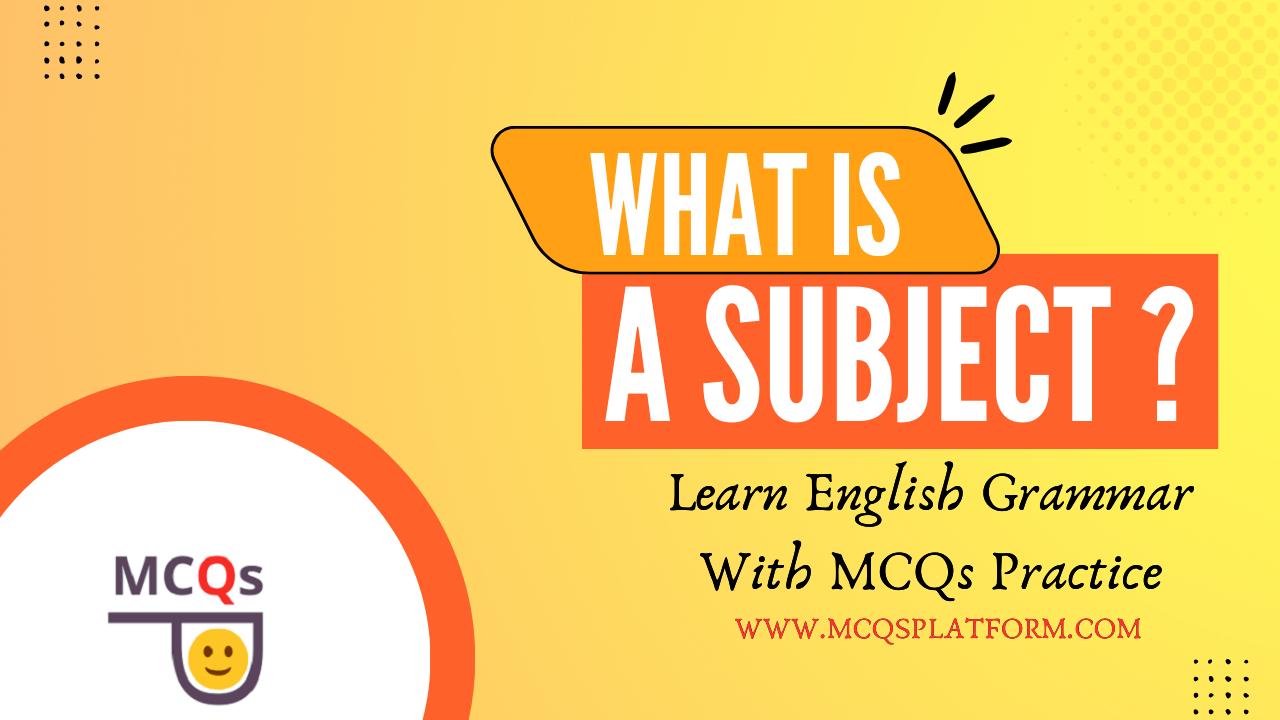
Understanding the subject in English grammar is like figuring out who or what the sentence is all about. It’s like the main character of a story, the one that the whole sentence revolves around. So, a student must understand “what is a subject in English Grammar?”
So, what exactly is this ‘Subject’ we keep talking about?
The subject is the part of the sentence that tells us who or what is doing something or who or what the sentence is about. It’s like the key to understanding the sentence. It usually comes at the beginning of the sentence and is often a noun (a person, place, thing, or idea) or a pronoun (like he, she, it, or they).
Let’s Break It Down:
- Who or What is doing the Action?
-
- In most sentences, the subject is the one performing the action.
- Example: “The dog (subject) barks (action/verb).”
-
-
- Here, the dog is doing the barking, so “the dog” is the subject.
-
- Who or What is being described?
- Sometimes, the subject isn’t doing an action but is being described.
- Example: “The sky (subject) is blue (description/verb).”
- Here, the sky is not doing anything, but it is being described, so “the sky” is the subject.
- Finding the Subject:
- To find the subject, ask yourself, “Who or what is this sentence talking about?”
- Example: “Sarah (subject) loves ice cream (action/verb).”
- The sentence is about Sarah, so she is the subject.
Types of Subjects
- Simple Subject
- Complete Subject
- Compound Subject
- Implied Subject
-
Simple Subject
- Definition: The simple subject is the main word or word group that tells whom or what the sentence is about. It is typically a noun or pronoun without any modifiers describing or limiting it.
- Characteristics:
-
- The simple subject is usually just one word.
- It does not include any adjectives or modifiers.
- The simple subject is the “core” of the subject.
- Examples:
- Dogs bark loudly.
-
-
- (“Dogs” is the simple subject; it’s the main word telling who is doing the barking.)
- She sings beautifully.
-
(“She” is the simple subject that identifies who is singing.)
-
Complete Subject
- Definition: The complete subject includes the simple subject and all the words that modify or describe it. This means that the complete subject may consist of adjectives, articles, and phrases that provide more information about the subject.
- Characteristics:
-
- The complete subject gives a fuller picture of what the sentence is about.
- It includes all descriptive words and phrases attached to the simple subject.
- Examples:
- The big, black dog barked loudly.
-
-
- (“The big, black dog” is the complete subject, including the simple subject “dog” and the modifiers “the,” “big,” and “black.”)
- A group of talented musicians is performing tonight.
- (“A group of talented musicians” is the complete subject, including the simple subject “group” and the modifiers “a,” “of talented musicians.”)
-
-
Compound Subject
- Definition: A compound subject consists of two or more simple subjects with the same predicate. The subjects are usually joined by a coordinating conjunction such as “and” or “or.”
- Characteristics:
-
- A compound subject allows the sentence to discuss multiple subjects performing the same action.
- The simple subjects are connected by a conjunction.
- Each part of the compound subject can stand as a simple subject on its own.
- Examples:
- John and Mary went to the market.
-
-
- (“John” and “Mary” are both part of the compound subject, sharing the predicate “went to the market.”)
- The cat, the dog, and the rabbit were playing in the yard.
- (“The cat,” “the dog,” and “the rabbit” form a compound subject, all sharing the predicate “were playing in the yard.”)
- Neither the teacher nor the students knew the answer.
- (“The teacher” and “the students” form a compound subject connected by “nor,” sharing the predicate “knew the answer.”)
-
-
Implied Subject
- Definition: An implied subject is the subject of a command or request, and it is usually not explicitly stated. In imperative sentences, the subject is understood to be “you,” even though it is not mentioned.
- Characteristics:
-
- The subject is understood rather than directly stated.
- It is common in commands and requests.
- The implied subject is always “you.”
- Examples:
- (You) Close the door.
-
-
- The subject “you” is implied in this command.
- (You) Please sit down.
- The subject “you” is implied in this request.
-
Important MCQs about Subject
Instructions: Your task is identifying the subject in the first 10 MCQs. However, the second part MCQs are about recognizing the type of subject used in the sentence.
Which word is the subject in the sentence?
Q. “The birds are flying in the sky.”
a) Flying
b) Birds
c) Sky
d) Are
Q. “Mary and John went to the market.”
a) Mary and John
b) Market
c) Went
d) To
Q. “The car stopped suddenly.”
a) Suddenly
b) Stopped
c) Car
d) The
Q. “Children love to play games.”
a) Games
b) Children
c) Play
d) Love
Q. “My brother is an excellent guitarist.”
a) Excellent
b) Brother
c) Guitarist
d) Is
Q. “The storm caused a lot of damage.”
a) Damage
b) Storm
c) Caused
d) Lot
Q. “We will attend the concert tomorrow.”
a) We
b) Concert
c) Tomorrow
d) Attend
Q. “The dog and the cat are friends.”
a) Friends
b) Are
c) Cat
d) The dog and the cat
Q. “The house on the hill belongs to them.”
a) The house on the hill
b) Them
c) Belongs
d) Hill
Q. “John’s favorite book is on the shelf.”
a) Book
b) Shelf
c) Favorite
d) On
